.

Director: Andrjez Wajda
By Roderick Heath
The agonies of the Second World War were, inevitably, a critical subject for Poland’s filmmakers after the war. Andrjez Wajda, who would become one of the country’s most admired and awarded filmmakers, emerged in the mid-1950s and reestablished Poland’s national cinema—at least as far as the rest of the world was concerned—with his epic “War Trilogy” about the travails of Polish partisans. His interest in the milieu was highly personal, having lost loved ones in the grand calamity, and his films are shot through with ironies, paying a certain lip-service to the triumph of the communists over the Nazis when his father had been executed along with thousands of other Polish army officers by the Russians. A Generation, featuring a teenaged Roman Polanski in the cast, certainly encapsulates the crucial mix of burgeoning energy in the postwar generation and its collectively haunted sensibility. Based on the autobiographical novel by Bohdan Czeszko, who also scripted A Generation, the film is as much noir thriller and coming-of-age tale as it is a war movie. The most affecting and original quality of A Generation, and its most influential aspect on subsequent decades of similar movies, is the way it manages without much sentimentalising to depict the regulation rites of passage of a young man in the context of an awesome, consuming struggle.
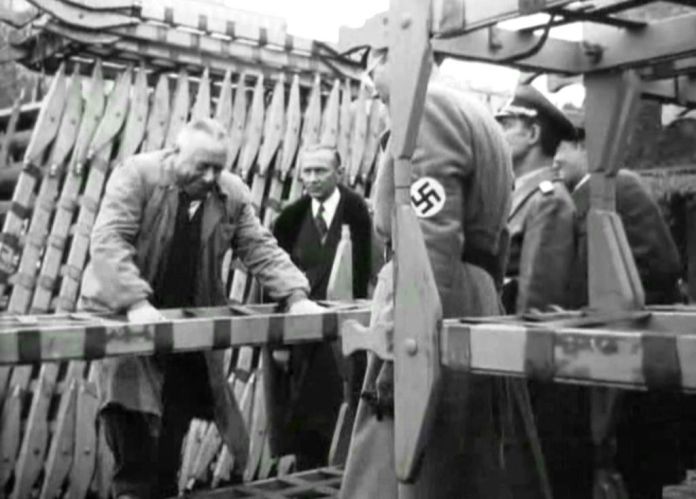
The central exemplar of the title generation is Stach Mazur (Tadeusz Lomnicki), a slum brat edging into manhood in the context of the German occupation. At the outset he’s seen engaged in a competition of knife tricks with his friend, the more handsome and accomplished Kostek (Zbigniew Cybulski). But when Stach, Kostek, and Zyzio (Ryszard Ber) go about their favourite sport of stealing hunks of coal from the moving trains that pass by their shanty town, Zyzio is shot by a German guard, and Kostek runs off. Stach has to abandon Zyzio’s body on the train and jumps off, too. In a quietly mourning and confused state, he meets amongst abandoned brickworks Grzesio (Ludwik Benoit), an injured, homeless veteran who introduces him to some working men in a tavern. They offer to get him an apprenticeship at a nearby woodworking factory. He replaces Jasio Krone (Tadeusz Janczar), who’s just graduated as a journeyman, and whilst worked hard as a flunky around the factory perpetually fetching pots of glue for the craftsmen, he also finds friends, including Jasio and Mundek (Polanski), and is taken under the wing of communist coworker Sekula (Janusz Paluszkiewicz). Everyone at the factory is involved in something on the sly: some are smuggling, and others are members of two competing groups of resistance fighters. The boss (Janusz Sciwiarski) both gladhands the Germans who buy bunks for soldiers from him and funnels money to the resistance, and he’s especially nervous because of some of his workers who belong to the noncommunist army are keeping a load of weapons in his storerooms. Stach discovers a pistol from this stash, and when he’s inspired by Dorota (Urszula Modrzynska), a girl who makes an appeal to students on behalf of the resistance, starts moving toward becoming an underground warrior.
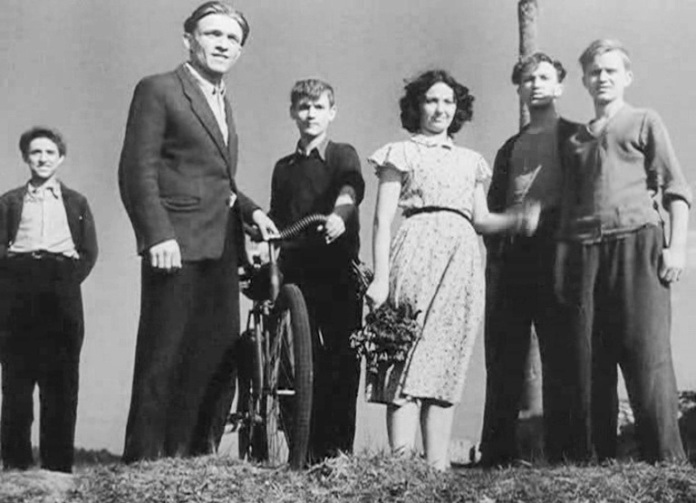
Whilst A Generation is clearly a product of a particular cultural moment and heightened artistic sensibility, it’s also a young film school brat’s ode to cinema, trying to enthusiastically blend an observational tone, based on personal experience and sensibility, with a narrative mediated through generic quotes. A Generation is spotted with visual and story quotes from such canonical gangster films as Angels with Dirty Faces (1937), The Roaring Twenties (1939), and White Heat (1949), but blended with a terse, ambient approach to emotion and action reminiscent more of Roberto Rossellini and neorealism in general. There are the early petty crimes, the confederacy of the spurned, doomed outsiders, and the final “big heist.” There’s also a lot of the attitude characteristic of eastern European literary traditions of the coming-of-age tale. Stach goes through familiar rituals of becoming a man: finding a community of working men and learning a trade, being schooled in the unfairness of capitalist economics by Sekula, and meeting, romancing, and finally losing his virginity to Dorota. Dorota appears as a proverbial dream girl with a touch of the warrior that makes her all the more sexy and alluring, a valkyrie on a pushbike, as well as symbolising the call to arms of an elevated, politically radical creed.
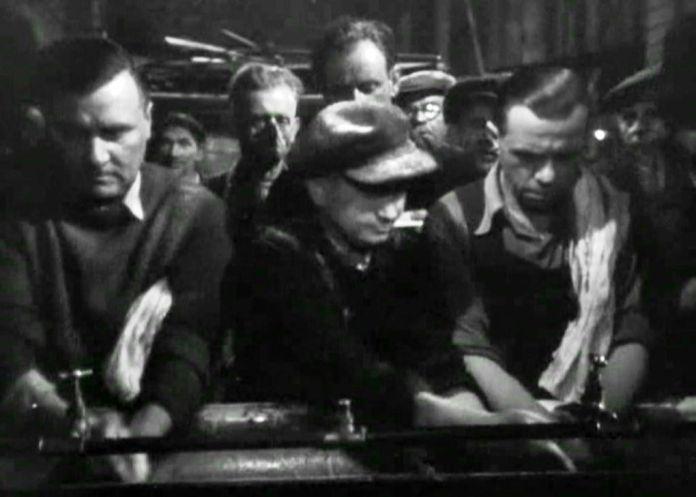
Jerzy Lipman’s superbly clear, unaffected cinematography helps Wajda keep the world he presents lucid and contiguous yet frosted with the lightest edge of a semi-abstract menace in places, be it in the cheerily busy confines of the factory or in the eerily quiet streets. Wajda presents twinning moments when the battered remnants of defeated armies appear to the heroes, lurching out of or disappearing back into shadows like spirits to urge the commitment of the living, with an edge bordering on expressionism. The film’s first image, a long panning shot behind the opening credits depicting an industrial wasteland dotted by shacks that prove to be a resilient kind of community, possesses an anticipatory quality as well as an analytical one. One can sense the early impulses of the kind of modernism fascinated by the expressive possibilities inherent in superficially dead places and cinematic frames that filmmakers like Antonioni and Polanski himself would expand upon, even as the texture of Wajda’s subsequent film looks back as much as it looks forward. Later on, cityscapes, with their sparse, eerie, drab multiplicities of concrete and brick, begin to entrap and terrorise the characters with Kafkaesque efficiency, particularly in a climactic suspense sequence, and the horrors of the repression of the Warsaw Ghetto are conveyed only by rolling blankets of smoke glimpsed over high walls, and over a fairground operating in blithe ignorance.
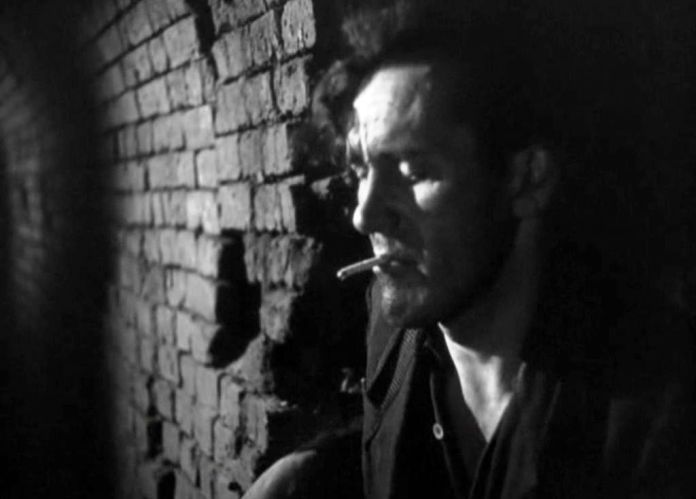
Wajda’s influence on both the French and British New Waves is hard to estimate, but certain. Reportedly, A Generation was a favourite film of British director Lindsay Anderson, and aspects of it are encoded in the DNA of Anderson’s If…. (1968), inevitably recalling the images of youth in violent uprising. Indeed, Wajda’s vision seems, oddly enough, to present his “generation” as a distinct youth movement, politically aware, radicalised, and ill at ease with the status quo. A Generation possesses a contextual awareness that is rich and feels less related to the quality of many ’50s English-language war films, which viewed war as a way to restore stability and the status quo rather than as a process of dynamic reconstruction. In this regard, it’s striking and thought-provoking that Wajda, considering his history, presents here a tale in which the communist guerrillas are depicted as being in competition with a villainous nationalist underground whose representatives in the factory are the most unpleasant and insensitive—one makes a sarcastic crack about the “Yids” finally bothering to fight when the Ghetto revolts—and who finally threaten Stach in a manner indiscernible from any Gestapo thug.

The youths fight war with the trappings and disguises of the everyday, and familiar experiences of the young are all sharpened and heightened by war. The underclass heroes take delight in how the war gives their impulses to anarchic acts of violence and crime social legitimacy. This is at first basic, as Stach describes himself somewhat sarcastically as a “real patriotic thief” in stealing from the coal trains. The long opening shot presents the veritable wasteland on the edge where Stach has grown up, and his manner of dress, with a jacket spotted with dozens of patches, seems like something almost out of prehistory. Stach evolves, as do the film’s visuals, from the fringes to becoming the representative for the continuation of a culture of resistance. The initial decrepit isolation Stach suffers living alone with his mother (Hanna Skarzanka) gives way to slowly developing, almost familial relationships, as the value of community is both emphasised and even promoted by the wartime setting. The younger characters are contrasted with older ones, like the paternal, knowing Sekula, and Jasio’s talkative but pathetic father (Stanislaw Milski), who works in the factory as a night watchman but who’s being forcibly retired. He was a former soldier himself, a veteran of the Tsar’s army, who was posted in Manchuria when he was his son’s age. Stach finally decides to take action after a vividly personal humiliation: Having picked up a load of lumber, he had an altercation with a grumpy gate guard, who took revenge by falsely reporting Stach for stealing to the German reservist officer or “Werkschutz” (Kazimierz Wichniarz) supervising the lumber yard. Stach was beaten and hounded out by laughing Germans, and the enraged Stach talks his young friends into assassinating Werkschutz when he visits his favourite local prostitute. The boys pull off this mission, though it’s Jasio who does the actual killing.
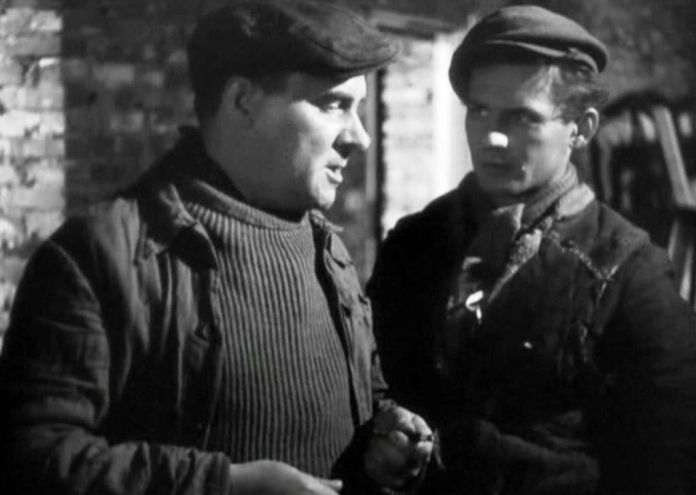
Whilst Stach is the narrative’s focus, Wajda eventually seems more interested in the conflicted Jasio, who prefigures the existential angst of Zbigniew Cybulski’s character in Ashes and Diamonds (1956). Torn about the risks to his hard-won place in the proper working class and leaving his father without his income, Jasio, initially hysterically proud of himself for shooting the German, is actually the first of the young lads to test his mettle and discover the terrible ambivalence of murder for patriotism’s sake. Later, when he anxiously decides to opt out of helping Stach and the others when Sekula asks them to help in getting people out of the Jewish ghetto during the uprising, he has a haunting encounter with Abram (Zygmunt Hobot), a Jewish friend who used to live in the same building as Jasio and who escaped the battle consuming the ghetto, covered in soot and filth. When Jasio seems uneasy about the prospect of him hiding out there, Abram promptly leaves, deciding to head back to the battle. Jasio, in a sudden flurry of fellowship, chases after him, only to see him disappearing into the darkness. The next day he joins the other partisans in their mission, hauling ghetto escapees out of the sewer, but Jasio is cut off from his companions and chased down by the Germans in the film’s set-piece sequence, a stunningly staged chase through hemming laneways and inside buildings, with Jasio finally cornered at the top of a grandiose flight of circular stairs. Rather than be caught, Jasio, in a moment of Cagney-esque defiance, leaps to his death, plunging down the stairwell as the Germans gaze down over the rails in bewilderment.
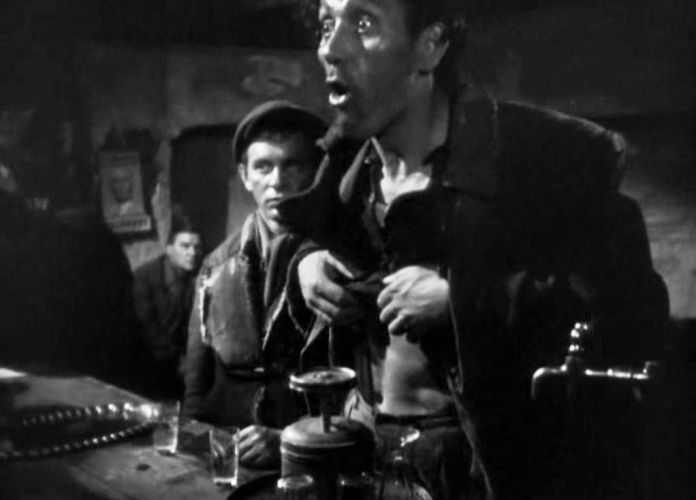
It’s to Wajda’s credit that he’s capable of perceiving the tragic, the heroic, the absurd and grubby, and the deterministic pathos in his heroes all at once, achieving transcendence and humiliation in singular fleeting glimpses. Jasio, whose death is the result of accidents, fumbling, and ill-fortune, finally dies as the very image of resistance. Whilst the story doesn’t give any easy out clauses for its heroes who, once they commit to action, bear the consequences stoically—they are killed off with a chilling casualness that anticipates Jean-Pierre Melville’s equally grim, unsparing take on resistance warfare, Army of Shadows (1969)—nonetheless it retains a tone of humanistic good cheer that borders on the Capra-esque when the residents of Stach’s slum instantly rally when Stach and his mother are threatened by the rival resistance men looking for their stolen pistol, and see off the intruders with blunt implements. In spite of the seriousness of the subject, an effervescent humour bubbles throughout the film, as when Grzesio shows off his combat scar on his belly only to be told off by a barmaid for lewd behaviour, and Krone rambling on with old war stories distinguished by the fact that nothing actually happened to him. After the managers of the factory give Stach a lecture about the value of hard work, Krone assures him, “Work and pray, and you’ll grow a hump!”
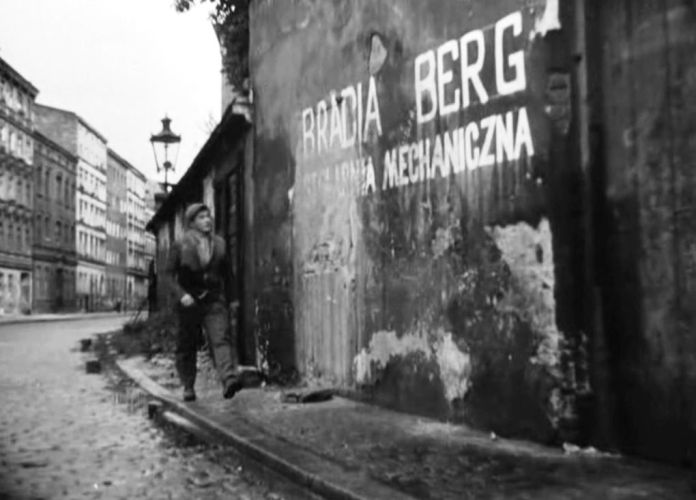
Stach’s attempts to work up something more than awed, dutiful fellowship with Dorota edge gently into familiar teen romance fare, as he’s initially awed not only by Dorota’s looks and self-containment, but also by the fact that she knows what she’s doing in the war far more than he initially does, telling Stach and his buddies off for killing a man in their own area, and lecturing partisans of all stripes in their vital military and ideological matters. Nonetheless, he finally charms her enough so that she becomes his lover, at which point Wajda deliver his most devilish twist: bouncing out in the early morning from her apartment to buy what pathetic trifles he can at a wartime store to give her a surprise breakfast treat, he returns in time to see Dorota being led away by the Gestapo.
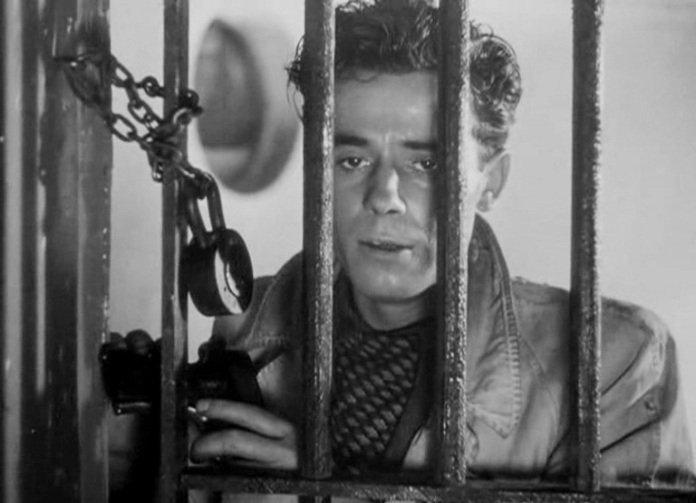
A telling difference between the mood Wajda tries to conjure and most of the war films being made in the West at the time is the terse, stoic attitude of the heroes, the lack of tears and fireworks when tragedies and transcendences come, particularly apparent in this moment: Stach’s silent horror and despair as he watches her from behind a closed door, only his eyes visible through a grate, and Dorota’s unfussy cooperation with her captors highlight the awareness in the characters of the innate danger and transience of what they’re doing. The film’s final scene is a brilliant culmination, as Stach sits, alone in his grief, with a teenaged boy ambling towards him in curiosity in the background. He proves to be one of a new band of youths, looking distressingly young and cheery, looking to join the partisans, and Wajda fades out on the sight of Stach, now the wise leader for the next generation, facing up to his task and putting aside his sorrow.

Excellent! Wadja pulled off a corker first film, and sneaks the ambiguity of who to resist right into practically every set-piece. An uncompromising view of the resistance efforts, even more starkly done in his “Kanal”, with as usual, great performances. The Iron Curtain was lifting a little at that time, luckily.
LikeLike
Well-said as ever, Van the man. This is a damn cool movie and I can’t help but wonder if Wajda’s due for cult rediscovery: this is a movie several different camps of cinema fans can converge on without shame.
LikeLike
I have recently been reading about the French Resistance, and the complications of rival factions of resistance fighters. The communists were very political and maneuvered themselves into positions of power and popular support near the end of the war very deftly. The losses, especially from Nazi reprisals when the Resistance dealt them a blow, were hideously high and brutal. So this film tracks with what seems to have been a common phenomenon in Resistance organizations.
I haven’t seen this film, but I watched the death of Jasio on YouTube. It’s a terribly exciting, extremely well-filmed sequence that, as you say, bears some resemblance to American gangster films. I can’t wait to see the rest of the film.
LikeLike
Oh yes, the film’s verisimilitude and flavour of experienced reportage are undeniable, even if, as I’ve pointed out, a little conveniently stacked in favour of the Communists. History, as they say, is written by the victors. I hope you do get around to it soon, Mare.
LikeLike
One must see all three in the triptych, next “Kanal” and finally “Ashes and Diamonds” – they are of a singular arc. “Kanal” is actually about the Warsaw Uprising that the pro-Western underground Home Army started when they thought the Russians, on the other side of the river, would help by attacking the Germans. Stalin let them die, and this isn’t stated by Wajda, it’s only hinted at, and certainly every Pole watching knew it. One of the Underground fighters, Daisy, played by Teresa Izewska, is one of the strongest women’s part in any film bar none – she was amazing.
My wife’s maternal grandfather was in Polish Intelligence when the war started, he always stressed “the anti-communist faction”, also noting they didn’t get along particularly well, but both sides were avid spy hunters, occasionally delivering warnings to the Germans just pre-war in body bags or such – such was the level of violence already. The perfidy of the Russians took the pro-Western faction pretty much by surprise, and shows the level of hatred between the factions. Using his channels in the spook world, he and his family escaped to Yugoslavia, where he assisted in the overthrow of the Pro-Nazi government. Hitler wasn’t happy about that, he needed a stable south to be able to attack Russia that summer. When Grandfather awoke one morning to exercise on the roof of the hotel they were staying at in Belgrade, he could see the Luftwaffe coming in low for the initial bombing. Everyone scrambled to the bomb shelter.
To escape Yugoslavia, which had more factions than can be believed, they had to ride a train through Croatian-controlled land, where the Ustaša, the Croatian pro-Nazis, were hauling all the Serbs off the train and shooting them on the side of the tracks, men, women, and children. He bluffed his way through by pretending to be a Nazi big-shot – his German was excellent – and the Croats let the train through.
He ended up in the south of France on a farm where they hid downed fliers and smuggled Resistance people along. I have a few silk handkerchief maps from some RAF chaps the got out. My mother-in-law, a cute little blonde girl, would occasionally smuggle papers hidden in her bicycle through German checkpoints on her way to school. He lived by his wits, running a travel agency before and just after the war, and may have smuggled Jews into Palestine for a while. The Communists were the worst, he always said, they were back-stabbers in Poland.
LikeLike
Fascinating history, Van! I remember seeing replicas of those handkerchief at D.C.’s spy museum and wondering how such things could pass undetected. But of course, every curtain has its seams. Your in-laws sound like incredibly courageous and intelligent people.
LikeLike
Marilyn, I guess that’s why certain films from the Soviet days resonate with me, and also why I have little patience with a lot of war films and pseudo-heroics. This trilogy is right up there with my favorite Soviet Thaw film, “The Cranes are Flying”, they all pushed boundaries for their time, a time when if you pushed back hard enough, you were “disappeared” for real. Wajda was a wonderfully subversive film-maker – yes, Rod, there it is again – and of course influenced generations of film people – the acting he wanted for his films was quite new, and still fresh-seeming.
LikeLike
“Jerzy Lipman’s superbly clear, unaffected cinematography helps Wajda keep the world he presents lucid and contiguous yet frosted with the lightest edge of a semi-abstract menace in places, be it in the cheerily busy confines of the factory or in the eerily quiet streets. Wajda presents twinning moments when the battered remnants of defeated armies appear to the heroes, lurching out of or disappearing back into shadows like spirits to urge the commitment of the living, with an edge bordering on expressionism.”
Superlative, but heck this is a Hall of Fame review, well worthy of the subsequent gems on the comment thread by Vanwall (and Marilyn of course) Wajda is one of Eastern Europe’s most vital artists, and this important first effort set the stage for a career that achieved even greater heights. I agree the British and French New Wave influence is unestimable, and that the film strikingly anticipated Melville’s ARMY OF SHADOWS. Interesting too that you see it as a forerunner to RESERVOIR DOGS and BREATHLESS.
Great character study here too! Quite a piece!
Like Vanwall, I also love THE CRANES ARE FLYING.
LikeLike
Cool comment thread, Van, Mare. Fascinating anecdotes aside, I hear you, Van, re: the acting styles.
Sam, to elucidate more on the point of how it’s a forerunner to Breathless and Reservoir Dogs, I mean that you can see the filmmakers in all three films picking out pieces from movies they like an combining it with aspects of hard experience and streetwise sensibility appropriate to the time and place of their making. Of course, the differences are vast too, but I don’t think it’s hard to discern the knock-on effect, Wajda to Godard, Godard to Tarantino, who has always owed a lot to Godard.
LikeLike